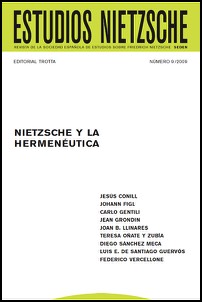¿Hay que incorporar a nietzsche a la hermenéutica? Razones de una pequeña resistencia
DOI:
https://doi.org/10.24310/EstudiosNIETen.vi9.10475Keywords:
verdad, interpretación, hermenéutica, nihilismo, postmodernismoAbstract
El tema del lugar de Nietzsche en la hermenéutica implica varias cuestiones: ¿el pensamiento de Nietzsche puede ser caracterizado como «hermenéutico»?, y ¿en qué medida, dado que la hermenéutica sólo ha sido desarollada como tal después de él? ¿Puede y debe la hermenéutica, que hasta hace poco no ha tenido muy en cuenta su pensamiento, incorporarlo todo entero? Si bien una fecundación mutua sería siempre fructífera, este trabajo defiende que deberíamos resistir frente a una integración simple en la hermenéutica, teniendo en cuenta su diferente manera de entender la verdad, la interpretación y el nihilismo. De este modo también se hace posible una resistencia frente a la concepción postmoderna y nihilista de la hermenéutica. Siendo conscientes de sus diferencias, la hermenéutica y Nietzsche tendrían mucho que contribuir uno a otro.
Downloads
Metrics
References
Abel, G., Interpretationswelten. Interpretationsphilosophie jenseits von Essentialismus und Relativismus, Frankfurt: Suhrkamp, 1993.
Clarke, M., Nietzsche on Truth and Philosophy, Cambridge: Cambridge UP, 1991.
Conill, J., El poder de la mentira. Nietzsche y la política de la transvaloración, Madrid: Tecnos, 1997.
Conill, J., Ética hermenéutica, Madrid: Tecnos, 2006.
Figl, J., «Nietzsche und die philosophische Hermeneutik des 20. Jahrhunderts. Mit besonderer Berücksichtigung Diltheys, Heideggers und Gadamers»: Nietzsche-Studien 10-11 (1981-1982), 408-430.
Gadamer, H.-G., Hermeneutische Entwürfe, Tubinga: Mohr Siebeck, 2000.
Grondin, G., «Vattimo’s Latinization of Hermeneutics. Why Did Gadamer Resist Postmodernism?», en S. Zabala (dir.), Weakening Philosophy. Essays in Honor of Gianni Vattimo, Montreal/Kingston: McGill-Queen’s University
Press, 2007.
H.-G. Gadamer, Verdad y método, trad. de A. Agud y R. de Agapito, Salamanca: Sígueme, 1977.
Heidegger, M., Nietzsche, Pfullingen: Neske, 1991.
Müller-Lauter, W., «Nietzsches Lehre vom Willen zur Macht»: Nietzsche-Studien 3 (1974), 1-60.
Nehamas, A., Nietzsche: Life as Literature, Cambridge: Harvard UP, 1985.
Nietzsche, F., Obras Completas, I-IV (OC ). Director ed. Diego Sánchez Meca. Madrid: Tecnos, 2011-2016
Nietzsche, F., Correspondencia I-VI. (CO). Director ed. Luis E. de Santiago Guervós. Madrid : Trotta, 2005- 2012.
Nietzsche, F., Fragmentos Póstumos I-IV (FP). Director ed. Diego Sánchez Meca. Madrid: Tecnos, 2006-2010.
Schmid, H., Nietzsches Gedanke der tragischen Erkenntnis, Wurzburgo: Königshausen & Neumann, 1984.
Schrift, A. D., Nietzsche and the Question of Interpretation. Between Hermeneutics and Deconstruction, Londres-Nueva York, Routledge, 1990.
Tugendhat, E., Der Wahrheitsbegriff bei Husserl und Heidegger, Berlín: de Gruyter, 1967.
Vattimo, G., Il soggetto e la maschera: Nietzsche e il problema della liberazione, Milán: Bompiani, 1974..
Downloads
Published
How to Cite
Issue
Section
License
As of issue 21 (2021) this journal is published only in open access (diamond route).
From that number 21, like the previous numbers published in NIETZSCHE STUDIES, they are subject to the Creative Commons Acknowledgment-NoComercia-ShareIgual 4.0 license, the full text of which can be consulted at <http://creativecommons.org/licenses/by-nc-sa/4.0 >
It is the responsibility of the authors to obtain the necessary permissions of the images that are subject to copyright.
This work is licensed under a Creative Commons Attribution-NonCommercial-ShareAlike 4.0 International License.
Copyright generates two different rights: moral rights and patrimonial rights that EJFB recognizes and respects. Moral rights are those relating to the recognition of the authorship. They are rights of a personal nature that are perpetual, inalienable, unseizable and imprescriptible as consequence of the indivisible union of the author and his/her work.
Patrimonial rights are those that can be derived from the reproduction, distribution, adaptation or communication of the work, among others.







11.png)
